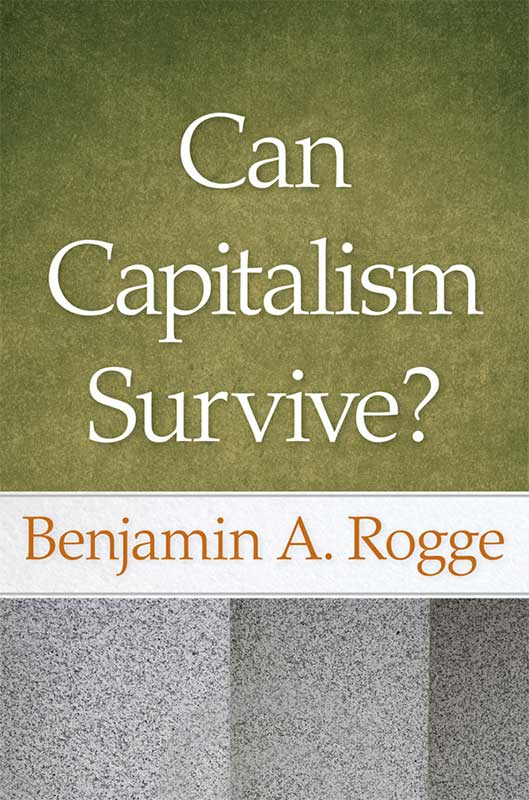Can Capitalism Survive?
By Benjamin A. Rogge
One of the signs of advancing age in the American college professor is a tendency for him to write less and publish more. This seeming paradox is easily explained by the phenomenon of
Collected Works, that is, by what on television would be described as reruns. As in television, no great public outcry is needed to bring forth the reruns; a question from his wife, a polite suggestion from a colleague, and the cut-and-paste operation is under way.I have put together here what I believe to be the best of the rather meager output of my professional career up to this point. For reasons (mostly financial) that always seemed adequate at the moment, I have been more of a speechmaker than a writer. Thus, you will find that many of the pieces in this collection are but speeches put down on paper…. [From the Foreword]
First Pub. Date
1979
Publisher
Indianapolis, IN: Liberty Fund, Inc. Liberty Fund, Inc.
Pub. Date
1979
Comments
Collected essays.
Copyright
The text of this edition is under copyright. Picture of Benjamin Rogge: file photo, courtesy of Liberty Fund, Inc.
- Foreword
- Part I, Introduction
- Part I, Chapter 1, Can Capitalism Survive
- Part II, Introduction
- Part II, Chapter 1, The Case for Economic Freedom
- Part II, Chapter 2, The Libertarian Philosophy
- Part II, Chapter 3, Who is to Blame
- Part II, Chapter 4, Paradise in Posey County
- Part III, Introduction
- Part III, Chapter 1, Adam Smith, 1776-1976
- Part III, Chapter 2, Christian Economics: Myth or Reality
- Part III, Chapter 3, College Economics: Is It Subversive of Capitalism
- Part IV, Introduction
- Part IV, Chapter 1, Profits
- Part IV, Chapter 2, The Businessman
- Part V, Introduction
- Part V, Chapter 1, The Labor Monopoly
- Part VI, Introduction
- Part VI, Chapter 1, The Long-Run Economic Outlook
- Part VI, Chapter 2, Alleged Causes of Inflation, Corporate Monopolies
- Part VII, Introduction
- Part VII, Chapter 1, The Problems of Cities
- Part VIII, Introduction
- Part VIII, Chapter 1, Financing Higher Education in the United States
- Part VIII, Chapter 2, The Promise of the College
- Part IX, Introduction
- Part IX, Chapter 1, The Businessman and the Defense of Capitalism
- Part IX, Chapter 2, Reflections on the Election of 1964
- Part IX, Chapter 3, The Foundation for Economic Education, Success or Failure
Part VI, Introduction
Part VI
ON MONEY AND INFLATION
In this section, I deal with that most ubiquitous of all diseases of economic life: inflation. As Lenin predicted, it is fast becoming the instrument of the disintegrating process in capitalist economies—though its ravages are equally visible in the socialist economies of the world.
The first paper is one version of a long-run-economic-outlook speech that I have been giving to various groups for a number of years. Given the bleakness of the outlook presented here, I wish that I could report that events have given the lie to my prophecies, but such does not seem to be the case.
The second paper, “Alleged Causes of Inflation: Corporate Monopolies,” was presented in March 1976 at the fourth annual conference of the Committee for Monetary Research and Education, held at Arden House, Harriman, New York.
Industrial Concentration and Inflation (Washington, D.C.: American Enterprise Institute, 1975), p. 1.
The Competitive Economy (1975).
Government Mandated Price Increases: A Neglected Aspect of Inflation (Washington, D.C.: American Enterprise Institute, 1975), p. 3.
Capitalism, Socialism, and Democracy, 3rd ed. (New York: Harper & Row, 1962), p. 99.
The Wealth of Nations (New York: Modern Library, 1937), p. 651.
Part VII

